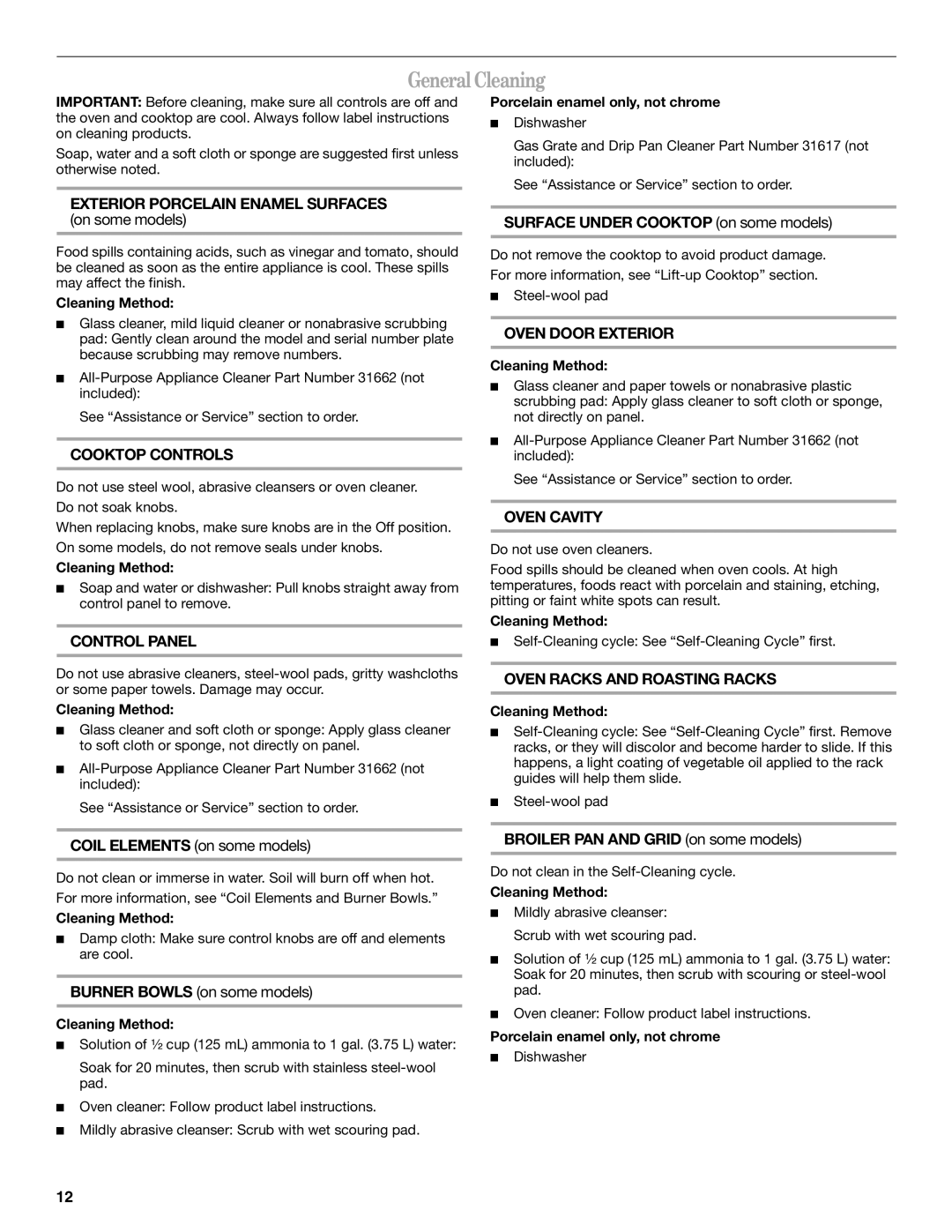
General Cleaning
IMPORTANT: Before cleaning, make sure all controls are off and the oven and cooktop are cool. Always follow label instructions on cleaning products.
Soap, water and a soft cloth or sponge are suggested first unless otherwise noted.
EXTERIOR PORCELAIN ENAMEL SURFACES
(on some models)
Food spills containing acids, such as vinegar and tomato, should be cleaned as soon as the entire appliance is cool. These spills may affect the finish.
Cleaning Method:
■Glass cleaner, mild liquid cleaner or nonabrasive scrubbing pad: Gently clean around the model and serial number plate because scrubbing may remove numbers.
■
See “Assistance or Service” section to order.
COOKTOP CONTROLS
Do not use steel wool, abrasive cleansers or oven cleaner.
Do not soak knobs.
When replacing knobs, make sure knobs are in the Off position.
On some models, do not remove seals under knobs.
Cleaning Method:
■Soap and water or dishwasher: Pull knobs straight away from control panel to remove.
CONTROL PANEL
Do not use abrasive cleaners,
Cleaning Method:
■Glass cleaner and soft cloth or sponge: Apply glass cleaner to soft cloth or sponge, not directly on panel.
■
See “Assistance or Service” section to order.
Porcelain enamel only, not chrome
■Dishwasher
Gas Grate and Drip Pan Cleaner Part Number 31617 (not included):
See “Assistance or Service” section to order.
SURFACE UNDER COOKTOP (on some models)
Do not remove the cooktop to avoid product damage.
For more information, see
■
OVEN DOOR EXTERIOR
Cleaning Method:
■Glass cleaner and paper towels or nonabrasive plastic scrubbing pad: Apply glass cleaner to soft cloth or sponge, not directly on panel.
■
See “Assistance or Service” section to order.
OVEN CAVITY
Do not use oven cleaners.
Food spills should be cleaned when oven cools. At high temperatures, foods react with porcelain and staining, etching, pitting or faint white spots can result.
Cleaning Method:
■
OVEN RACKS AND ROASTING RACKS
Cleaning Method:
■
■
COIL ELEMENTS (on some models)
Do not clean or immerse in water. Soil will burn off when hot.
For more information, see “Coil Elements and Burner Bowls.”
Cleaning Method:
■Damp cloth: Make sure control knobs are off and elements are cool.
BURNER BOWLS (on some models)
Cleaning Method:
■Solution of ¹₂ cup (125 mL) ammonia to 1 gal. (3.75 L) water:
Soak for 20 minutes, then scrub with stainless
■Oven cleaner: Follow product label instructions.
■Mildly abrasive cleanser: Scrub with wet scouring pad.
BROILER PAN AND GRID (on some models)
Do not clean in the
Cleaning Method:
■Mildly abrasive cleanser: Scrub with wet scouring pad.
■Solution of ¹₂ cup (125 mL) ammonia to 1 gal. (3.75 L) water: Soak for 20 minutes, then scrub with scouring or
■Oven cleaner: Follow product label instructions.
Porcelain enamel only, not chrome
■Dishwasher
12
